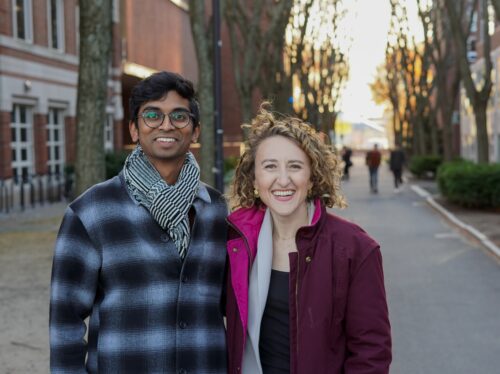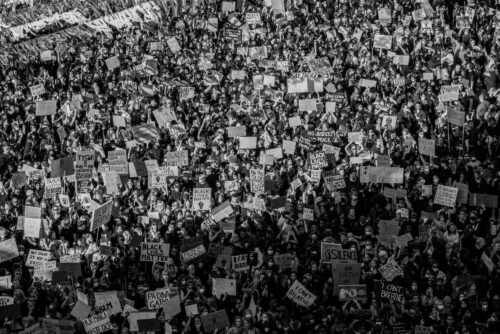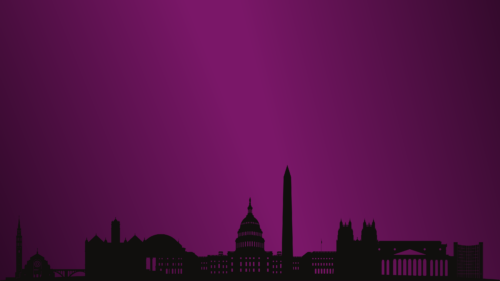Leah Wright Rigueur is Associate Professor of Public Policy at HKS and her research interests include 20th Century United States political and social history and modern African American history.
“Think about four years ago, most people could not except for Black people, but most people could not say the phrase ‘Black lives matter.’ That was actually an extraordinarily hard thing for people to do. We were having presidential debates where people were like, ‘Of course black lives matter because all lives matter.’ It was a qualifying statement. And now we have all races, it’s a multiracial movement of people chanting in the street, including even a certain Senator from Utah who was a presidential candidate in 2012, chanting the phrase ‘Black lives matter’ in defense of justice.
“What Black people have consistently used protests for and done through protests, is to declare to the world that the system is not working and that we want to live. This is why we often hear things like, ‘I can’t breathe, black lives matter, black lives matter too.’”
“The safeguards that we envision when we think or talk about American democracy have failed Black people. It doesn’t work for Black people. It was never meant to include Black people. So what I would argue, and what I would point out, and what I want us to think about, is that Black protest actually represents our best chance at a true democracy for all people, because it highlights the ways in which democracy actually doesn’t work for very many people.”
Megan Ming Francis is an Associate Professor of Political Science and an Adjunct Professor of Law, Societies, and Justice at the University of Washington and a fellow at the Ash Center. Francis specializes in the study of American politics, race, and the development of constitutional law.
“To understand kind of the anger and the frustration around policing in 2020 means to go back, not just in terms of the 1960s, but to push that back even more. What happens because it is clear at least for Black people, at the end of the 19th and the early 20th century, that the most important civil rights issue is racial violence. That before African-Americans can go to school, before they can own a house or vote, they have to have the right to live.”
“Black people have been fighting for the right to live forever. All of American history is filled with stories about Black people trying to live…and if you don’t know that, you have to think about why you don’t know that history.”
Kaneesha Johnson is a fourth-year PhD candidate in the department of government at Harvard University. Kaneesha’s research focuses on inequality, race, and punishment systems. She is the co-author of Deadly Justice: A Statistical Portrait of the Death Penalty.
“The first forms of policing in the United States began as a social control mechanism for Black people and for other racially marginalized groups.”
“If we were to just look at Boston as an example, in 1825, less than $9,000 or just 2% of the total city budget was allocated to all phases of policing, which included only nine police officers. In contrast today in Boston, it spends close to $420 million or upwards of 15% of its annual budgets, and employees 2,200 police officers.”
“The welfare reforms of the 90s meant that the safety nets available for people started to completely disappear. Participation in the SNAP Program, or what is more commonly known as food stamps, fell by almost half and that cannot be explained by declines in poverty alone. And then we see in the 90s, that there has been a huge criminalization of Black parents and Black families, and we can see that in the tropes of the Deadbeat Dad or the Welfare Queen. So we’ve seen Black families and Black people just being funneled and inserted into the carceral state.”
Rhea Boyd MD is a pediatrician and child health advocate who works clinically at Palo Alto Medical Foundation and University of California San Francisco (UCSF) Benioff Children’s Hospital Oakland.
“Police violence is a health problem and we have been saying it for decades.”
“Nearly 1,000 people are killed by police in the United States every year. But if you don’t die in that encounter, you also may be subject to injuries, disabilities, mental health impairments as a result. And some of the most profound data among the health impacts regarding the health effects of police violence, look at the effect on the population that witnesses that violence.”
“So if you zoom out of the 1,000 people who might die in police encounters, we have to think of the exponential numbers who just experienced force during a police encounters, which is much more common. And then you have to zoom out to anyone who witnessed that either in person, on their cell phone, on the internet or through a secondhand account. We have decades of research that tell us that witnessed violence cumulates in mental health impairments like depression, anxiety, PTSD, that usually we describe around like soldiers and leaving war, where you re-experience and you participate in hypervigilant behaviors to avoid that happening to you in the future.”



